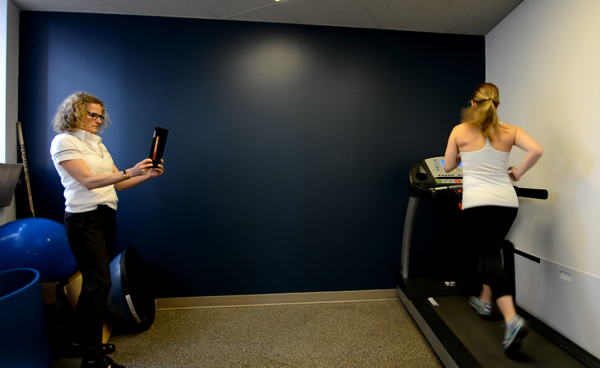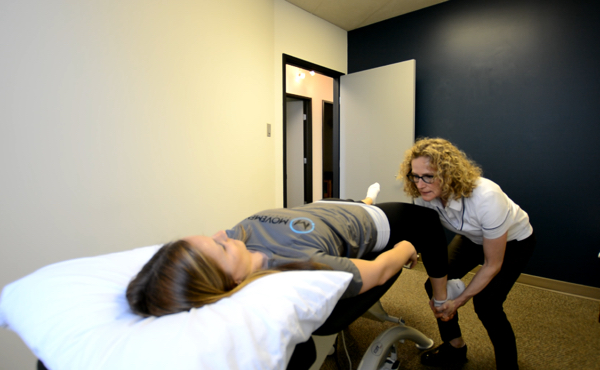Blog
Physiotherapy Running Assessment
Find out what to expect during a Physiotherapy Running Assessment

For a physiotherapist, the primary objective in performing a running assessment is to address injury issues. Sometimes, despite appropriate rest and good treatment, running injuries can be quite persistent. It is our goal to determine causative factors, create an intervention strategy and formulate a return to run plan. Injury prevention can also be a key aspect of assessing a runner. As we are not running coaches, it is not our role to provide comprehensive training programs, but we can certainly address programming as part of injury management.
It is important to know that there is not only one way to run. Our bodies are all different and movement patterns differ because of this individuality. There are some factors that have been researched and shown to impact joint loading forces, injury risk and running efficiency. We will examine these factors in relation to how you can run most effectively, efficiently and without pain.
When you come to Movement Sports Clinic for a running evaluation you can expect the following components: subjective history; physical evaluation; treadmill running video analysis and recommendations. These components are explained in more detail below. The process takes about an hour. You will need to bring runners and be prepared to run for a few minutes on a treadmill. Tighter fitting clothes are best for observation. Women should wear a tank or jog top. Men can wear a singlet type shirt or be shirtless.
Subjective History
When determining the cause of an injury, particularly persistent or recurrent ones, we need to know a lot about you. Many questions may not seem relevant but all add up to what is unique about your body, how it responds to training stress and what makes you vulnerable to injury. Here are some of the things we will ask about so you can help prepare your answers:
Youth Activity Levels: Sports you did as a youth will influence your body as an adult. Bone density, flexibility, agility and muscle fibre type can be altered through active childhood and adolescence.
Injury History: This is a big one as it speaks to the durability of your body and toughness of your connective tissue. Also, once injured, there is a higher likelihood of re-injury.
Stress and Sleep: High stress and poor quality sleep make us more likely to get injured and less likely to recover quickly.
Medical History: Cardiac issues, bone density, medications, history of cancer, surgeries and pregnancies can all influence how the body deals with training, impact stress and tissue healing.
Current Injury: What is going on with you now and when did it develop. What treatments have you had or what have you done to self-manage. What treatments, diagnostic imaging, and type of practitioners have you been working with. What has helped and what has not. Were there any big changes in training (frequency, duration and intensity) leading up to the injury.
Running History: Information such as age you started, what types of races you have done, personal best times, quality and frequency of training and whether you have a coach will all influence injury likelihood.
Running and Racing Goals: Are you competitive, do you just want to run for fun and fitness, are you tackling a new distance or an ultra? All these factors need to be considered to formulate the best plan.
Shoes and Orthotics: Your shoe choices, experiences and use of orthotics can all provide more information about what has influenced you and your body as a runner.
Training: How often you run, weekly mileage, speed work sessions, days off and cross training are important factors. Whether you weight train, go to yoga or Pilates, or do triathlons is also important to know.
Goals: What is it you want to accomplish? Just get running again, run 10km, tackle a marathon or ultra? Goals and motivation are helpful in building a timeline, managing expectations and formulating a plan.Physical Assessment
Physical Assessment

This section includes a movement screen where you are asked to do some basic movements to help assess mobility, balance, strength and stability. We also examine
This section includes a movement screen where you are asked to do some basic movements to help assess mobility, balance, strength and stability. We also examine joint range of motion, muscle activation patterns and tissue extensibility. Muscle strength is also tested. Palpation for taut muscle bands and tender points can help us localize sensitized areas in the body. Remember that just because an area is sore doesn’t mean it is the cause of the injury. Stiff hips can cause knee pain, poor trunk control can make hips weak, a sore ankle can cause gluteal inhibition. We want to determine the source of injury, not just treat the pain.
Treadmill Video
Watching a runner from different angles in slow motion will complement what we find in the physical examination. How much bounding in the stride, numbers of foot falls per minute, arm swing pattern, leg cross over pattern, foot strike, body lean, trunk rotation, hip drop and breathing are all factors to consider. We will review the video with you to help point out relevant findings and improve your body awareness.
Recommendations
After considering all the information gathered, we are able to come up with recommendations for injury management, prevention or improved efficiency. Recommendations are usually one or more of the following: home exercises to help deal with mobility or stability issues, gym programs to build strength, running cadence changes, running drills, training modifications, treatment in the form of manual therapy or dry needling, diagnostic imaging, or referral to sports medicine physician.
Our goal is to get you back running and meeting your movement and performance goals.
Videos can be emailed to you on request.
We look forward to seeing you in the clinic soon!
Watch the video below for an inside look at a Physiotherapy Running Assessment!






